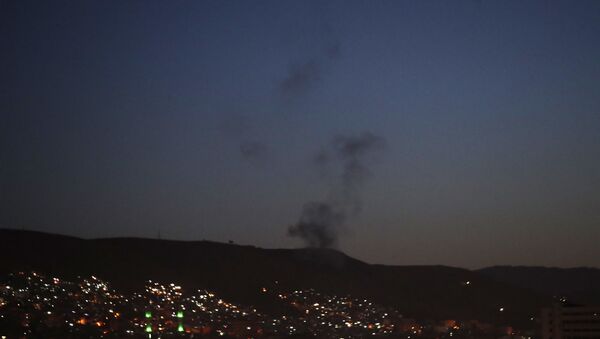Sputnik: The Israeli position on the strikes that were conducted, we haven’t really had an official confirmation yet, although it seems that other sources are more or less confirming that it was in fact Israel that made the strikes. Why hasn’t Israel come out and confirmed this?
Chuck Freilich: Israel is trying to avoid an escalation in the north, which could really happen any time now. It’s a very delicate situation so by keeping things quiet; by keeping a low profile Israel hopes that things won’t escalate.
READ MORE: Terrorists Preventing OPCW Team From Accessing Syria’s Douma — Moscow
I think the real question here is a much deeper one: it’s not why Israel is or isn’t responding in a certain way; it’s why various countries are doing what they are. Why Iran is trying to set up a forward base in Syria to use as operating base against Israel.
Sputnik: How does Israel view its role in the Syrian conflict?
Chuck Freilich: I think it’s a defensive role. Israel has no particular interests of its own in what’s happening in Syria or Lebanon.
READ MORE: Lavrov: Militants Who Attacked UN Mission in Douma Were Warned in Advance
Beyond that it’s purely defensive. Israel doesn’t want to be attacked by Iran and Hezbollah, and so it’s trying to protect its border and it has been forced to take these actions, which it doesn’t want to do and it may have to escalate, which it certainly doesn’t want to do but this will be a result of what Iran and Hezbollah do.
Sputnik: Israel maintains normal relations with Russia and with the US and with other Western allies, how do you see Israel’s role, caught sort of in the middle in the Syrian crisis. How do you see that further developing is there going to be a point in time where Israel will have to choose sides or will Israel avoid that at all costs?
Chuck Freilich: Israel as you said has good relationship both with Russia and the United States and is caught in the middle. I think it doesn’t want to be in this position. I do not think the United States is intensively engaged and, as you said, President Trump wants to withdraw American troops and either replace it or not replace it with an Arab force.
I think the real question is whether the intensive negotiations, the contacts that has existed in recent years between Israel and Russia, between Prime Minister Netanyahu and President Putin, whether we can really translate this into an effective outcome. Because the primary player in Syria today is Russia and it also has control over the other primary player, the secondary one which is Iran.
I think Russia can play, it doesn’t, of course, have to have complete control, but it can play a major role in determining how things develop.
The views and opinions expressed by Chuck Freilich are those of the speaker and do not necessarily reflect those of Sputnik.




